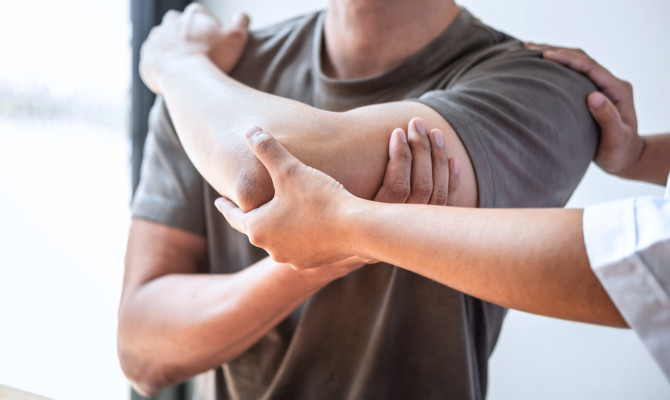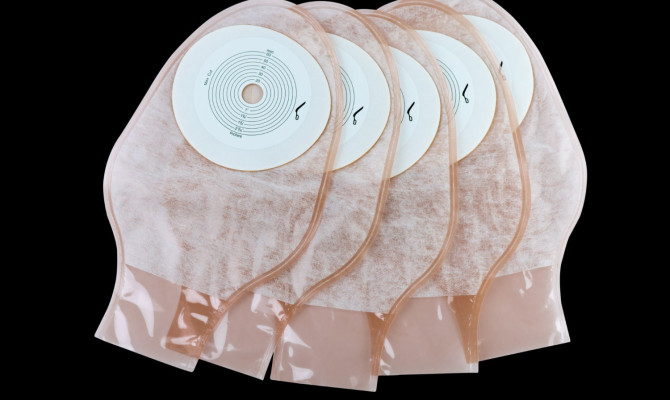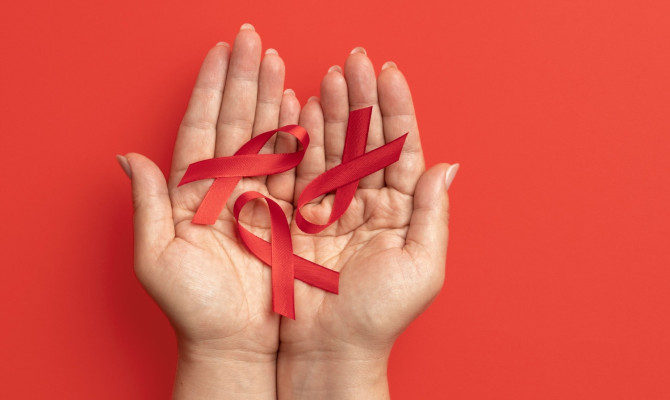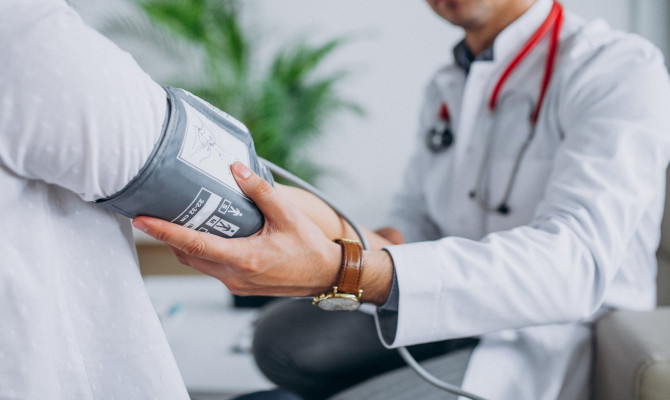Crohn’s Disease Infusion Therapy: Types, Procedure & Side Effects

- Crohn's disease
- 05 Oct 2023
Overview
Crohn’s Disease
If an individual has Crohn’s disease, the health professional might advice for infusions (intravenous drugs) to manage the disease. Crohn’s disease is a persistent condition that causes pain and swelling of the gastrointestinal tract. It is an inflammatory bowel disease with symptoms such as severe abdominal pain, uneasiness, and gut ulcers. The infusions for Crohn’s disease are generally biological medicines a doctor gives in a health clinic. The infusion prevents the body’s inflammatory reaction, which stimulates the breakout of the disease. The medicines decrease the possibility of disease outbreaks and harsh symptoms but also have potential adverse effects 1 Overview | Researched based study from National Institutes of Health.

The article will explain everything you need to know about Crohn’s infusion treatment, its procedure, and side effects and also try to explain specific popular queries regarding Crohn’s disease infusions.
Infusion
Infusion Therapy for Crohn’s Disease
The usual treatment for Crohn’s disease is maintaining the appropriate diet and taking oral anti-inflammatory medications. Sometimes, doctors also prescribe painkillers and antibiotics to manage the symptoms. With time, the condition might cause stiffening of the gut and might require surgical operations to avert other complexities.
Crohn’s disease infusions are the drugs health professionals give into the veins over time. The doctor advises infusion treatment to the patient only under the following circumstances-
- When other treatment for the disease does not respond.
- The patient is healthy enough to bear the additional adverse effects of the treatment.
Moreover, the doctor has to provide the infusions in an aseptic (free of microbial contamination) environment 1 Infusion Therapy| Researched based study from National Institutes of Health .
How long does a Crohn’s disease infusion take?
- Doctors give the infusions in a hospital; the treatment usually lasts three to four hours.
How often do you take Crohn’s disease infusion?
- The doctor will regulate the dose per the patient’s requirement and infuse the drug at eight weeks intervals.
- However, the patient might get noticeable improvement in the disease condition only after eight weeks of the first infusion.
Types
Types of Crohn’s Disease Infusions
Crohn’s disease infusions are usually biological drugs. Biologics are medications made from living organisms, and it attacks the body proteins that initiate inflammation reaction.
The FDA approved biologics for Crohn’s disease are listed below-
Stelara (ustekinumab)
- The drug attacks the body’s two proteins that stimulate swelling and pain. The doctors give the infusion only once, and the patients must take only injections as maintenance treatment. The patients have to take the infusion at eight weeks intervals.
Entyvio (vedolizumab)
- Entyvio is an integrin receptor antagonist (anti-inflammatory drug) approved only for adults. The doctor will give the infusion 14 days after the first dose and wait another 42 days for the subsequent amount.
- The doctor will provide the sustenance therapy after eight weeks interval.
Tysabri (natalizumab)
- Tysabri is also an anti-inflammatory medication that falls under the drug class alpha-4 integrin inhibitor.
- The doctors give the Tysabri infusions at 28-day intervals. The patient might see noticeable improvement only after three inputs or 84 days. However, the drug has potential adverse effects on patients, such as depression.
Remicade (Infliximab)
- Infliximab is an anti-inflammatory medication that is from the drug-class anti-tumor necrosis factor.
- The FDA has approved infliximab medication for use in youngsters of six years and older.
- The dosing schedule for infliximab infusion is 14 days after the first infusion and 42 days after the second infusion. The doctors give the maintenance therapy for infliximab infusion at 8-week intervals.
IXIFI (Infliximab-qbtx)
- With Crohn’s disease the patient might develop fistulas. Fistulas are strange connections between the gut and the anal skin.
- Infliximab-box assists in fistula depletion and also prevents other fistulas from reappearing.
- The doctor gives the Infliximab-qbtx infusion at 14-day intervals and then at 42-day intervals. The patients must maintain the Infliximab-qbtx infusion for eight-week breaks 3 Types | Researched based study from National Institutes of Health .
Procedure
Procedure for Crohn’s Disease Infusion
- The doctors or nurses give Crohn’s disease infusions at the hospital or a health clinic.
- The nurse will put an intravenous cannula (fine tube) into a vein in the arm.
- Then the nurse will attach the drug to the intravenous line to give the infusion into the patient’s body.
- As the patient might encounter sensitivity reaction, the nurse initially gives the infusion at a lesser speed and slowly increases it with time.
- However, the individual must notify the nurse about any difficulty, viz; nausea, headache, breathing problems while taking the infusion.
- After the completion of the infusion, the doctor might allow the patient to go home under another person’s supervision for any symptoms of an allergic reaction 4 Procedure| Researched based study from National Institutes of Health .
Side Effects
Side Effects from Crohn’s Disease Infusion
Individuals might encounter several adverse effects after Crohn’s disease infusion.
Some of them are listed below:
- Inflammation (swelling and pain) at the injected site
- Headache
- Skin redness
- Skin marks
- Fever
- Feeling of coldness
- Hives
- Itching
- Nausea and vomiting
However, biological infusions might show extended adverse effects as the drug suppresses the body’s natural immune system to combat infections.
So, the physician might recommend the patient on biological infusion to inform if he notices any of the following symptoms:
- Decreased liver function
- Infections
- Joint pain
- Muscle ache
- Skin rash
- Lupus (a condition that causes body inflammation) 5 Side Effects| Researched based study from National Institutes of Health .
Living With
Living with Crohn’s Disease
Crohn’s disease is a continuing inflammatory bowel disease that destroys the digestive tract.
The disease impairs the body’s ability to take up essential nutrients and impacts correct digestion and removal of waste products. Crohn’s disease can also impact any portion of the gastrointestinal tract, but the most affected part is the ileum, i.e., the last segment of the small intestine.
Because of swelling and pain, the individual might get the following symptoms:
- Rectal bleeding
- Emergency bowel movements
- Difficult passing out stools
- Abdominal pain
- Fatigue
- Weight decline
However, with the disease, the individual’s other vital parts can also get affected viz; eyes, skin and joints. The patient might also experience specific periods with or without symptoms. Sometimes remission is also seen in patients with symptoms improving and colon sores healing 9 Living with Crohn’s | Researched based study from National Institutes of Health .
Complications
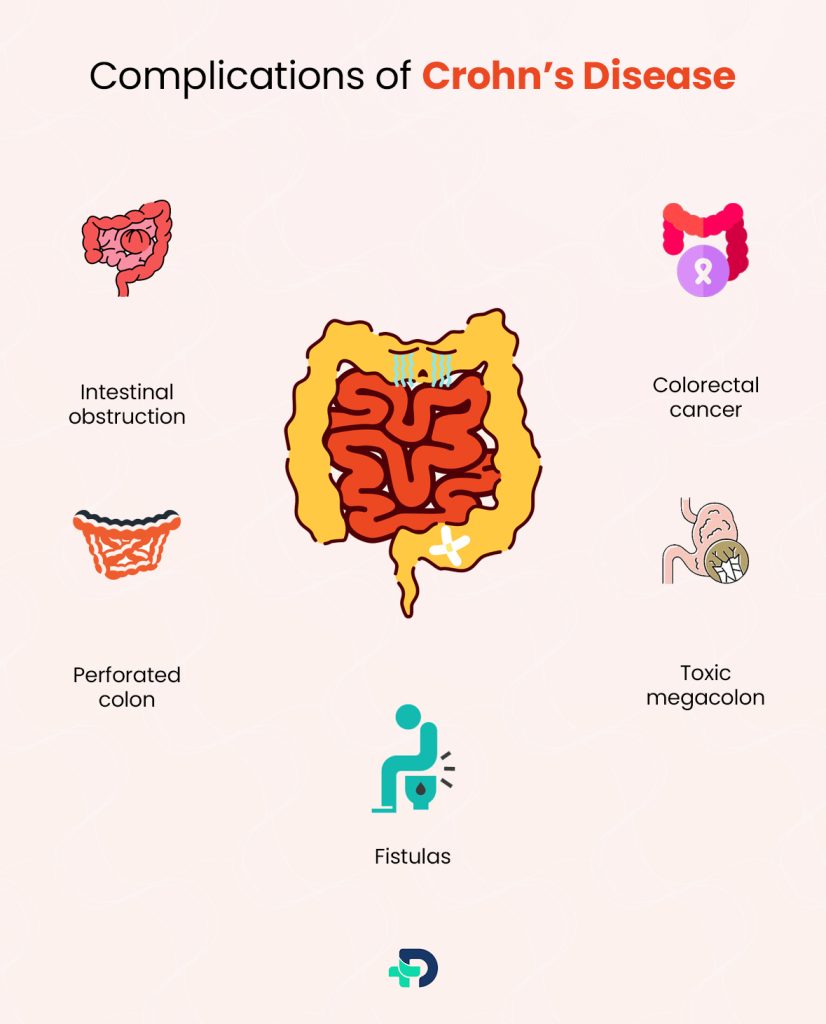
Complications of Crohn’s Disease
With correct lifestyle modification and treatment, Crohn’s disease is not severe. However, Crohn’s disease can become a severe illness with fatal consequences if not treated. Some of the complications of untreated Crohn’s disease are listed below-
- Intestinal Obstruction
- Colorectal cancer
- Perforated colon
- Fistulas
- Toxic megacolon
Intestinal obstruction
- Sometimes due to swelling and pain, stricture develops due to blister formation in the colon wall. Stricture is the unusual tapering of the body passage.
- Without medication, the stricture might stop the blood supply to other intestinal parts, leading to tissue and cell death, which can cause fatal infections.
Colorectal cancer
- Individuals with a prolonged period of Crohn’s disease might develop colorectal cancer. Colorectal cancer is the unusual tissue growth of the rectum and colon.
- Research has found that Crohn’s disease patients are more likely to expire from colorectal cancer than patients without Crohn’s disease.
Perforated colon
- Perforated colon is the hole in the bowel wall. It can leak the contents into stomach and cause bacterial infections of the abdominal tissue (peritonitis). Later the infection can travel through blood to other body parts causing severe ailments.
- Urgent surgery is a must to correct the perforated colon condition.
Fistulas
- Fistulas are the unusual connection between two different organs and generally occur from blisters in the gut. Sometimes, fistulas may form pustules that might get infected.
- To treat large fistulas, doctors might use drugs and surgical procedures.
Toxic megacolon
- Although rare, toxic megacolon is one of the severe consequences of Crohn’s disease. People with the condition cannot shrink the colon, and so has terrifyingly swollen abdomen. Without treatment, it can lead to colon perforation and severe infections.
Moreover, in addition to the complications listed above, a Crohn’s disease patient might suffer from persistent anemia and nutrient absorption issues 10 Complications| Researched based study from National Institutes of Health.
FAQs
Frequently Asked Questions about Crohn’s Disease
Q. How long does Crohn’s disease infusion last?
- The Crohn’s disease infusion might last from half an hour to three hours for the majority of the Crohn’s disease treatment.
Q. What is the latest treatment for Crohn’s disease?
- The FDA approved the Rinvog drug for adults with considerable to severe Crohn’s disease who have no response to tumor necrosis factor inhibitors 6 FAQs| Researched based study from United States Food and Drug Administration.
Q. What is the best treatment for Crohn’s disease?
- Patients who took steroid medication and anti-inflammatory drugs have found much improvement in Crohn’s disease symptoms.
- However, doctor’s choice of treatments depends on certain conditions such as disease site, disease seriousness, and the patient’s medical condition.
Q. What is the first line treatment for Crohn’s disease?
- The first line of treatment for Crohn’s disease comprises steroids to ease the pain severity before beginning the anti-tumor necrosis factor therapy for managing the condition.
- The therapy for Crohn’s disease will depend on the patient’s severity and medical condition 7 FAQs | Researched based study from National Institutes of Health .
Q. How is life after Crohn’s disease?
- People might find difficult at times to live with the Crohn’s disease. However, one can live generally if the disease’s symptoms are well managed with appropriate medication.
- There is no particular diet for adults with Crohn’s disease but the youngsters must live on liquid food to regulate the symptoms.
- Always speak to the health professional before making a massive change in your diet. Above all, try to maintain a balanced healthy diet 8 FAQs | Researched based study from National Institutes of Health.
Takeaway
Crohn’s Disease Infusion Therapy: Takeaway
- The health care professionals will advise Crohn’s disease infusion treatment only when all other treatments fail to give desirable results.
- Crohn’s disease infusion is a pretty efficient therapy in delaying the disease progression.
- However, people taking up the infusion treatment for Crohn’s disease must be watchful of potential adverse effects viz; muscle ache, joint pain, and infections.
Any feedback on this article?
 This Articles content was accurate
This Articles content was accurate Very Informative Article
Very Informative Article I have a question or a comment
I have a question or a comment
 This article contains inaccurate content
This article contains inaccurate content This article was not helpful
This article was not helpful I have a question or a comment
I have a question or a comment
We appreciate your helpful feedback!
Checkout our social pages
References
-
National Institutes of Health
Overview
-
National Institutes of Health
Infusion therapy
-
National Institutes of Health
Types
-
National Institutes of Health
Procedure
-
National Institutes of Health
Side Effects
-
United States Food and Drug Administration
FAQs
-
National Institutes of Health
FAQs
-
National Institutes of Health
FAQs
-
National Institutes of Health
Living with Crohn’s
-
National Institutes of Health
Complications












